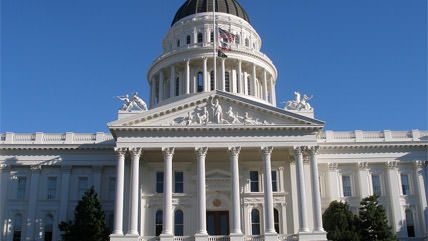Fixing California: Freer Markets and Fewer Contraptions
The state currently operates like a Rube Goldberg Machine.

Sacramento—Watching state legislators construct fixes to the state's problems reminds me of those bizarre contraptions that the late cartoonist Rube Goldberg would devise, as he "invented" complicated, funny methods to achieve simple tasks.
In his haircut machine, a hyena laughs, thus insulting a blind mouse, who thinks the hyena is laughing at him. The mouse angrily runs off onto a disc, which triggers a series of levers that eventually push a starving Lilliputian goat to a man's head. The goat nibbles on the man's hair, then falls over into a cradle after it is full.
Goldberg's contraptions were delightfully ridiculous, yet strangely reminiscent of a state Legislature that can't come up with a straightforward approach to the simplest problems. One recent example: It took two years for it to pass a bill designed to make it easier for administrators to remove sex predators from the classroom. The final measure was filled with maddening complexities that would have made it harder to fire bad teachers. The governor rightly vetoed it. And that's what happens when legislators actually try to fix something.
Most problems—such as the state's unfunded pension liabilities, the nation's highest poverty rate, education failures and others detailed in the U-T's Fixing California series — are off the table given the power of status-quo-defending interest groups to derail actual solutions. So the reform blueprints get more complicated and far-fetched.
California officials have gotten the general-fund budget in order after voters approved large tax increases last year. But the fundamental crises still are festering, as was detailed in the Fixing California introduction:
"California now has the highest rate of poverty in the nation. … The state government is awash in debt, hundreds of billions of dollars, much of it stemming from the Cadillac salaries, pensions and retiree health-care benefits paid to state employees. … The state that historically was among the last to fall into recession and among the first to pull out it, has flipped …
"The educational performance of California students now ranks near the very bottom … . The state lost 33 percent of its industrial base from 2001-2012, declining 11 percent more than in the United States as a whole … . State and local government regulatory agencies are strangling the efforts of small and large businesses to expand. … Many local governments are also in financial peril."
Solutions, though, won't be found in complex new rule-making or more spending.
What to do about the poverty rate? Unleash job creation by lowering tax rates and reducing the control of regulators. What to do about debt issues? Reduce the decade-long policy of pension and benefit enrichment, by holding the line in contract negotiations and by outsourcing services. One great idea: a proposed state pension-reform initiative that would let cities roll back pension benefits for current employees going forward.
What about the state's public schools? Instead of tinkering with an immovable bureaucracy beset by outdated work rules that quash innovation, the state should unleash competitive pressures through vouchers, expanded charter schools and a more aggressive "parent trigger" system.
Sometimes the leadership gets it, epitomized by Gov. Jerry Brown's support of hydraulic fracturing regulations that, although more cumbersome than necessary, allow this job-creating industry to grow. But such good news remains hard to come by.
As Professor Joel Kotkin, a Democrat, explained in a Fixing California installment published Oct. 27, California remains committed to a green politics that makes it tough for poorer people to get ahead. "Particularly damaging are steps to impose mandates for renewable energy that have made electricity prices in California among the highest in the nation and others that make building the single-family housing preferred by most Californians either impossible or, anywhere remotely close to the coast, absurdly expensive," he wrote.
And California's tax code seems designed to minimize growth, argued economist Art Laffer in a commentary on Nov. 10. "California does have the sunshine, that's true, but to believe all your taxes are giving you a better quality of life and better public services is not true," he wrote in the series about his 2006 move from California to Tennessee. He found that Californians enjoy poorer services because we overpay for them.
What California needs is amazingly simple — lower taxes to spur creative activity, a more reasonable regulatory climate, educational choice, less government intervention and more competition. These policies are not complex, but they are effective.
Instead, each Capitol session is reminiscent of a less-funny version of Goldberg. Officials assemble legislative contraptions that complicate state bureaucracies and add new hurdles for businesses. Then everyone wonders why the goat didn't do a good job cutting the man's hair. One day, though, our leaders might realize that the best solution involves a pair of scissors.
This article originally appeared in the San Diego Union-Tribune.


Show Comments (21)